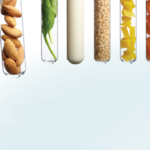
Parents face ongoing challenges in raising healthy, well-nourished children in a world where sugary temptations lurk around every corner.
RAISING HEALTHY KIDS –
As a nutritionist and mom of three kids ages 16, 13, and 9, I feel like I’ve seen it all regarding food. Parents face ongoing challenges in raising healthy, well-nourished children in a world where sugary temptations lurk around every corner. I learned to pick my “battles,” and just kept showing up each day in the kitchen with a variety of healthy foods, consuming healthy foods myself (role modelling is one of the best ways to encourage positive relationships with food), and continually teaching my kids about its importance. Knowledge is health. When we understand why, it’s so much easier to make the right choice.
Our kids are health-conscious, but given the opportunity, they are always eager to eat treats and sugar, and I’m honestly not surprised. My kids can tell when a dessert tastes “too sweet,” but they still love it. I was once addicted to sugar myself; part of the low-fat food craze, my diet consisted of very little fat, tons of carbs and sugar, and only protein on occasion. It took years to kick off my sweet tea habit, to train my tastebuds, and my kids’, so a bite of a juicy, fresh-picked strawberry tastes sweet. What kept me committed was that I felt more energy, less pain, better sleep, and better physical shape. Most people don’t consider food a drug, but sugar, white flour, and refined carbs are akin to drugs, as they are addictive substances that affect brain neurotransmitters similar to the effect produced by alcohol. The taste for sweets leads to a craving for more sugar. However, the human body cannot handle refined sugar, so we must retrain our tastebuds.
SUPPORT HEALTHY GUT BACTERIA
The impact of sugar on the microbiome is a relatively new area; however, it reveals that too much sugar can negatively affect the trillions of microorganisms housed in our digestive system. A balanced and diverse microbiome in our children is essential for proper growth, development, and immune function.
Sugar acts as a fuel for harmful bacteria, leading to an overgrowth at the expense of good bacteria. This can lead to poor digestion and absorption of nutrients. Beyond the gut, we know that the microbiome communicates with the brain via the gut-brain axis, sending signals that impact our mood, emotions, learning, energy, etc. Your gut contains 500 million neurons connected to your brain through these nerves. The type of food you eat is critical to properly establish a healthy connection between the gut and the brain. The gut microbiome will flourish with an abundance of fibrous foods and fermented foods such as yogurt, kefir, and sauerkraut, all of which contain beneficial bacteria. Limiting refined and sugary food is a key dietary strategy to improve good bacteria in the gut.
Healthy habits
A healthy daily routine and lifestyle, including proper sleep, adequate hydration, and nutritious food, are essential to support my kids’ growth and health. They also take a few different supplements, including magnesium, vitamin D3, omega-3 fish oils, and a probiotic to support the growth of their good bacteria. As a mom, I recognize sweet treats are inevitable at celebrations. However, limiting my kids’ consumption to special occasions rather than incorporating them into our daily routine works well for our family.
– Yours in health,
Karlene, author of This Kitchen Is for Dancing














